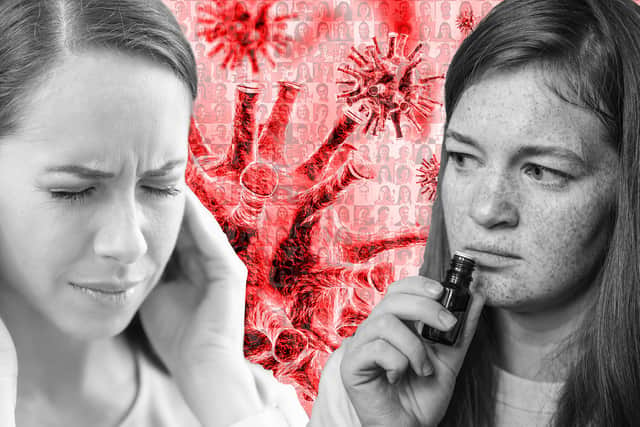Covid symptoms: warning over 2 Omicron signs to ‘take seriously’ that could cause long-term damage
and live on Freeview channel 276
Covid cases are surging across the UK with people being warned not to ignore symptoms.
The list of symptoms linked to coronavirus has become much more diverse over the last two years.
Advertisement
Hide AdAdvertisement
Hide AdThe NHS added nine additional symptoms to its official list earlier in the year, which previously just included a high temperature, a new continuous cough, and a loss or change to sense of smell or taste.
The expansion reflects the wider array of symptoms that have been reported since the outbreak of the Omicron variant, with many of the signs being similar to the common cold and flu.
The most common symptoms, according to the ZOE Covid study app, continue to be a runny nose, fatigue, sore throat, sneezing and a headache, but Professor Tim Spector, lead scientist of the app, has warned that there are two signs of illness that people should “take seriously”.


What two symptoms should I look for?
Prof Spector has warned that tinnitus, or ear ringing, and loss of smell are two symptoms of Covid that need to be taken “really seriously”.
Advertisement
Hide AdAdvertisement
Hide AdThe alert comes after he said he and his team carried out a survey to assess the prevalence of tinnitus among people infected with Covid.
Of 14,500 people who took part in the survey, 5,000 experienced ear problems after testing positive for the virus.
Participants said the symptom “comes and goes” and ranges from mild to moderate “for weeks or months”.
Prof Spector admitted that he had suffered with tinnitus himself after getting Covid, but it “disappeared quickly” in his case.
Advertisement
Hide AdAdvertisement
Hide AdSpeaking in a YouTube video, he said: “Most people, that’s over 50%, said they were still experiencing some form of ear ringing that probably comes and goes, and is mild or moderate for a few weeks or months afterwards.
“This is a bit of a shock to me, I thought it would be just something that went. I did get it but it disappeared quite quickly in me.
“Obviously a lot of people do suffer from tinnitus and you told us that that generally got worse when you got infected, and I think it’s a symptom that now is also going along with some of these long Covid symptoms.”
Prof Spector went on to say that the symptom, along with a loss of sense of smell, should be taken seriously as both could be signs of more permanent long-term problems.
Advertisement
Hide AdAdvertisement
Hide AdHe added: “This highlights the first time that ear ringing, as with long-term loss of smell that we saw particularly with previous variants, is something to take really seriously because it does suggest that a different part of the body has been affected, more internal, close to the brain.
“And we’ve heard anecdotally from my ENT colleagues that they have seen an increase in referrals of tinnitus following Covid.
“It really is something that we need to know more about and see whether people are going to end up with more permanent problems.”
What are the other key symptoms of Covid?
The NHS list of Covid symptoms now includes 12 key signs of infection to look for. These include:
Advertisement
Hide AdAdvertisement
Hide Ad- a high temperature or shivering (chills) – a high temperature means you feel hot to touch on your chest or back (you do not need to measure your temperature)
- a new, continuous cough – this means coughing a lot for more than an hour, or 3 or more coughing episodes in 24 hours
- a loss or change to your sense of smell or taste
- shortness of breath
- feeling tired or exhausted
- an aching body
- a headache
- a sore throat
- a blocked or runny nose
- loss of appetite
- diarrhoea
- feeling sick or being sick
It is advised that you stay at home and avoid contact with other people if you have Covid symptoms, as well as a high temperature or if you do not feel well enough to go to work to do your normal activities.
Comment Guidelines
National World encourages reader discussion on our stories. User feedback, insights and back-and-forth exchanges add a rich layer of context to reporting. Please review our Community Guidelines before commenting.
